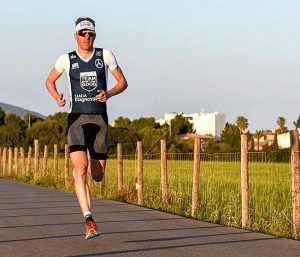Many have experienced it, some even get it very often - the cramp! Although the pharmaceutical industry would still like us to believe that the intake of magnesium can remedy this, the knowledge about the causes has come much further in the meantime.

For us athletes, especially endurance athletes, three different main causes have emerged, and this does not include magnesium deficiency.
1. the most common cause is not properly prepared and trained muscles. This includes the right intensity, duration, as well as the important regenerative measures such as stretching.
2. in second place is usually the lack of water, that is, dehydration. In sports, it is not a matter of drinking as much as we are thirsty, but as much as we really need. In endurance sports, especially during long sessions, the rule of thumb should be 0.75 - 1 liter of fluid per hour. This amount can vary individually depending on the conditions (temperature, humidity, effort).
3. right after that comes the sodium deficiency. Unlike the non-athletic population, which often consumes too much sodium, athletes tend to have too low an intake. Especially in endurance sports, where we are active for several to very many hours and this is accompanied by a large loss of sweat, the additional intake is usually the right remedy against possible cramps.

Whether by taking a salt tablet, salty energy gels (e.g. our tomato gel) or adding a little table salt to the drinking bottle - there are many ways to take precautions here.
As a guide, 1-2 g of table salt (not sodium!) per hour can be considered here.
It should be remembered that sports drinks usually contain about 1 g of table salt per liter. Gels also contain sodium or table salt. Important: 1g sodium = 2.54 g table salt!
Let's move on to magnesium
The proportion of magnesium in the body's sweat is very low compared to sodium (salt). In addition, we normally consume magnesium in sufficiently large quantities in our diet. The additional intake of magnesium should therefore be based on a blood count, if possible.
By the way: Magnesium affects the entire musculature, including the intestinal muscles. Therefore, intake during exercise is quickly counterproductive and can lead to diarrhea.
You are welcome to download this article from the series "Das muss mal gesagt werden" as a download as PDF.
![]() You can find more statements of this series on this overview page ...
You can find more statements of this series on this overview page ...
